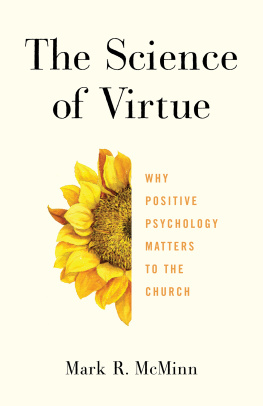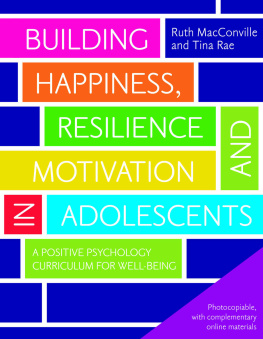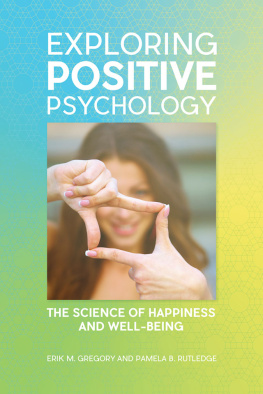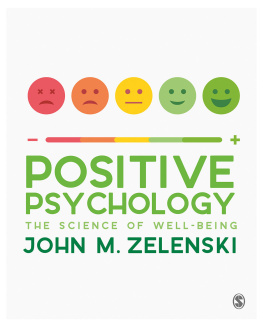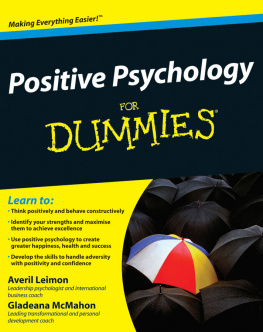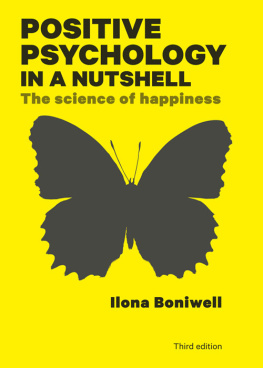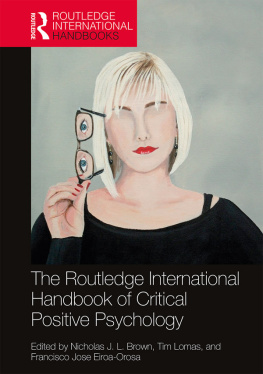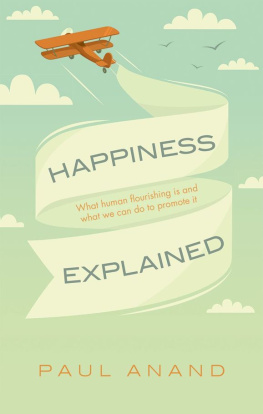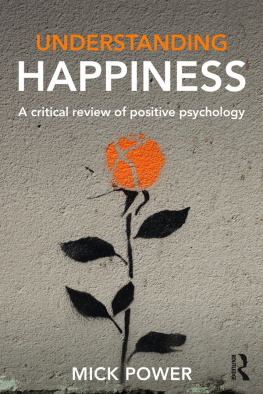Mark R. McMinn - The Science of Virtue: Why Positive Psychology Matters to the Church
Here you can read online Mark R. McMinn - The Science of Virtue: Why Positive Psychology Matters to the Church full text of the book (entire story) in english for free. Download pdf and epub, get meaning, cover and reviews about this ebook. year: 2017, publisher: Baker Publishing Group, genre: Religion. Description of the work, (preface) as well as reviews are available. Best literature library LitArk.com created for fans of good reading and offers a wide selection of genres:
Romance novel
Science fiction
Adventure
Detective
Science
History
Home and family
Prose
Art
Politics
Computer
Non-fiction
Religion
Business
Children
Humor
Choose a favorite category and find really read worthwhile books. Enjoy immersion in the world of imagination, feel the emotions of the characters or learn something new for yourself, make an fascinating discovery.
- Book:The Science of Virtue: Why Positive Psychology Matters to the Church
- Author:
- Publisher:Baker Publishing Group
- Genre:
- Year:2017
- Rating:5 / 5
- Favourites:Add to favourites
- Your mark:
- 100
- 1
- 2
- 3
- 4
- 5
The Science of Virtue: Why Positive Psychology Matters to the Church: summary, description and annotation
We offer to read an annotation, description, summary or preface (depends on what the author of the book "The Science of Virtue: Why Positive Psychology Matters to the Church" wrote himself). If you haven't found the necessary information about the book — write in the comments, we will try to find it.
Mark R. McMinn: author's other books
Who wrote The Science of Virtue: Why Positive Psychology Matters to the Church? Find out the surname, the name of the author of the book and a list of all author's works by series.
The Science of Virtue: Why Positive Psychology Matters to the Church — read online for free the complete book (whole text) full work
Below is the text of the book, divided by pages. System saving the place of the last page read, allows you to conveniently read the book "The Science of Virtue: Why Positive Psychology Matters to the Church" online for free, without having to search again every time where you left off. Put a bookmark, and you can go to the page where you finished reading at any time.
Font size:
Interval:
Bookmark:
2017 by Mark R. McMinn
Published by Brazos Press
a division of Baker Publishing Group
P.O. Box 6287, Grand Rapids, MI 49516-6287
www.brazospress.com
Ebook edition created 2017
All rights reserved. No part of this publication may be reproduced, stored in a retrieval system, or transmitted in any form or by any meansfor example, electronic, photocopy, recordingwithout the prior written permission of the publisher. The only exception is brief quotations in printed reviews.
Library of Congress Cataloging-in-Publication Control Number: 2017021728
ISBN 978-1-4934-1121-4
Unless otherwise indicated, Scripture quotations are from the Holy Bible , New Living Translation, copyright 1996, 2004, 2015 by Tyndale House Foundation. Used by permission of Tyndale House Publishers, Inc., Carol Stream, Illinois 60188. All rights reserved.
Scripture quotations labeled NIV are from the Holy Bible, New International Version. NIV. Copyright 1973, 1978, 1984, 2011 by Biblica, Inc. Used by permission of Zondervan. All rights reserved worldwide. www.zondervan.com
Mark McMinn is the rare scholar who can masterfully integrate scientific psychology, Christian theology, and counseling practice. In The Science of Virtue , he places the best of contemporary positive psychology research in fruitful dialogue with ancient Christian wisdom. McMinns writings are always intellectually stimulating with fresh insights on important interdisciplinary questions, but it is the practical or formational dimension of his writing that sets his work apart. This book not only contributed to my understanding of key Christian virtues but also gave me clear strategies for practicing the virtues.
Steven J. Sandage , Boston University
McMinn has written an important book concerning the compatibility of faith and science. He marries the role of virtuous living with scientific findings and encourages both the church and the academy to cooperate in an effort to help people become all they were created to be. Anyone of faith who counsels people should use this book as a guide to practice and thinking.
Linda Mintle , Liberty University College of Osteopathic Medicine
To Auden, Juniper, Eden, Mark, Wesley, and Nashmy six grandchildren.
Stretch toward virtue as you face the joys, suffering, blessings, and pain life will offer you.
Cover
Title Page
Copyright Page
Endorsements
Dedication
Acknowledgments
Introduction: A New Conversation about Virtue
1. Wisdom
2. Forgiveness
3. Gratitude
4. Humility
5. Hope
6. Grace
Conclusion: Lets Work Together
Notes
Bibliography
Index
Back Cover
I have been married for thirty-eight years to Lisa, a sociologist, author, and lovely human being. We consider each other to be our first readers, which means we see those drafts that are not yet ready for anyone else to read and recommend ways to make them better. Once again, Lisa was my first reader for every chapter in this book. She graciously pointed out the best parts and the worst, and helped me find my way forward where my ideas and words were confusing or unclear.
As will be evident in almost every chapter, I am grateful to the John Templeton Foundation for funding a three-year grant that allowed my colleagues, students, and me to study positive psychology and the church. Dr. Nicholas Gibson, the program officer at Templeton who directed this grant, was particularly helpful in reviewing the grant proposal and providing feedback along the way. My colleagues Dr. Rodger Bufford and Dr. MaryKate Morse were collaborators on the grant. Dr. Ward Davis at Wheaton College supervised one of the grant projects. Thanks also to George Fox University and Wheaton College doctoral students who worked on the projects funded by the grant: Andrew Cuthbert, Laura Geczy-Haskins, Paul McLaughlin, Jeff Moody, and Jens Uhder.
I work in a remarkably healthy psychology department, made so in no small part by our department chairperson, Dr. Mary Peterson. My faculty colleagues and doctoral students help me think better than I would without them, and I am thankful for their ongoing role in my professional and spiritual development. Heidi Cuddeford, one of our departments administrative assistants, went well beyond the call of duty to help make the Templeton grant projects successful. Adriana Rangel-Ponce served as an undergraduate assistant who helped with reference citations for the early versions of the manuscript.
The church where I worship each week, Newberg Friends Church, has been part of this project in various ways. Pastors Gregg Koskela and Steve Fawver influenced the curriculum we developed for a wisdom-mentoring program, and the church elders and administrative staff welcomed us to partner with them in running the program. Tamera Brand, Denise and Kevin Brooks, Marcile Crandall, Elaine and Gregg Koskela, Carol and David Sherwood, and Elizabeth and Steve Sherwood all served as capable mentors in the wisdom-mentoring program. Natalie Koskela and Megan Anna Neff both contributed in important ways to the wisdom project as wellin Natalies case by conducting interviews with wisdom participants and in Megan Annas case by providing theological insight as we developed the curriculum. The Children of the Light Sunday school class allowed me to teach on each of the chapters in this book and offered helpful feedback along the way.
I also appreciate the pastors and other churches that partnered with us on various projects, including Pastors Jeff Getsinger, Lynn Holt, Jed Maclaurin, Bill Moorman, Rich Miller, Ken Redford, and Andrew Yarborough. Dr. Rebecca Ankeny, former superintendent of the Northwest Yearly Meeting of Friends, was particularly helpful as we established working relationships with churches and pastors.
Finally, I am thankful for the highly professional editorial and design team at Brazos Press. They believed in this idea and helped me craft the manuscript into what it has become.
Introduction: A New Conversation about Virtue
. Christopher Peterson and Martin E. P. Seligman, Character Strengths and Virtues: A Handbook and Classification (Washington, DC: American Psychological Association; New York: Oxford University Press, 2004).
. Alasdair MacIntyre, After Virtue , 3rd ed. (Notre Dame, IN: University of Notre Dame Press, 2007).
. Everett L. Worthington Jr., What Are the Different Dimensions of Humility?, Big Questions Online , November 4, 2014, https://www.bigquestionsonline.com/2014/11/4/what-are-different-dimensions-humility.
. Paul C. Vitz, Psychology as Religion: The Cult of Self- Worship , 2nd ed. (Grand Rapids: Eerdmans, 1995).
. L. Gregory Jones and Clestin Musekura, Forgiving as We Have Been Forgiven: Community Practices for Making Peace (Downers Grove, IL: InterVarsity, 2010).
. Stanton L. Jones, Psychology: A Students Guide (Wheaton: Crossway, 2014).
Chapter 1 Wisdom
. Paul McLaughlin and Mark R. McMinn, Studying Wisdom: Toward a Christian Integrative Perspective, Journal of Psychology and Theology 43 (2015): 12130.
. Paul B. Baltes and Jacqui Smith, The Psychology of Wisdom and Its Ontogenesis, in Wisdom: Its Nature, Origins, and Development , ed. Robert J. Sternberg (Cambridge: Cambridge University Press, 1990), 94.
. Robert J. Sternberg, A Balance Theory of Wisdom, in The Essential Sternberg , ed. James C. Kaufman and Elena L. Grigorenko (New York: Springer, 2008), 354.
. Paul B. Baltes et al., People Nominated as Wise: A Comparative Study of Wisdom-Related Knowledge, Psychology and Aging 10 (1995): 15566.
Font size:
Interval:
Bookmark:
Similar books «The Science of Virtue: Why Positive Psychology Matters to the Church»
Look at similar books to The Science of Virtue: Why Positive Psychology Matters to the Church. We have selected literature similar in name and meaning in the hope of providing readers with more options to find new, interesting, not yet read works.
Discussion, reviews of the book The Science of Virtue: Why Positive Psychology Matters to the Church and just readers' own opinions. Leave your comments, write what you think about the work, its meaning or the main characters. Specify what exactly you liked and what you didn't like, and why you think so.

